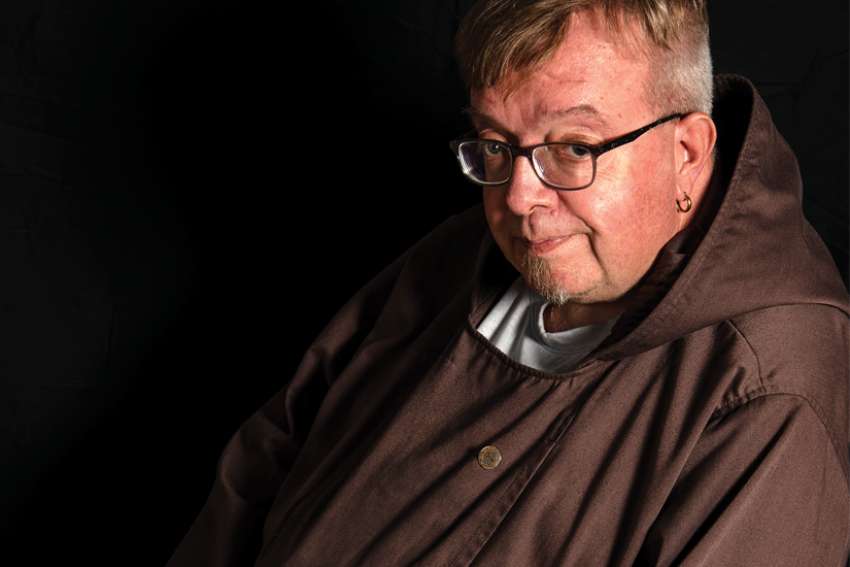In the City of Toronto alone there are 63 shelters with more than 6,900 beds, stuffed to the gills. There are 15 Out of the Cold sites run mainly by faith communities that also run at capacity most nights. There are over 100,000 families and individuals in Toronto on a waiting list for subsidized housing.
In Ontario, the Ontario Association of Food Banks claims 130 direct members that support over 1,200 hunger-relief programs. Across Canada, where more than three million people live below the poverty line, one million people were helped last year by a food bank, including 340,000 children.
Capuchin Franciscan Br. John Frampton is astounded by how little we notice. He’s had politicians pose as volunteers at St. Francis Table, using the poor as a campaign backdrop. He’s given testimony to an endless list of commissions of inquiry and community listening exercises, but nobody seems to want to see or hear from the poor themselves, he said.
“It’s not brain surgery,” he said on a typical Thursday at St. Francis Table in Toronto’s long-troubled Parkdale neighbourhood. “You have to talk to the people.”
It’s a sentiment that was echoed by Pope Francis, who reminded all that “the poor are not numbers, but people,” in his message for the third World Day of the Poor, which is marked on Nov. 17.
The Pope has used the event to invite all people “to do good deeds for the poor and to open their arms for people living in poverty.”
In his case, the Pope has opened a temporary, week-long walk-in clinic for the poor in St. Peter’s Square, where last year more than 3,500 were treated. And after Mass Nov. 17, he’s hosting 1,500 poor for lunch.
At St. Francis Table, the goals are more modest, but no less necessary. It has been serving more than 200 meals a day for over 30 years, relying strictly on donations and the $1-a-meal charge to patrons.
Despite Canada’s goal to reduce the poverty rate by 50 per cent in the next 10 years — and a dip in the number below the poverty line — the problems of the poor can go deeper than dollars and cents, and they are not easy to solve.
Thirty-one year old Ruby Eby is missing several teeth where his smile should be. He’s mired in a legal process with his roommate in a supportive housing complex. But the charges of assault laid against his roommate won’t go to court for months. In the meantime Eby is afraid to go home.
At school Eby was in the special needs program. When school was done his father got him enrolled in the Ontario Disability Support Program. He lives on about $1,000 a month, plus whatever he can pick up washing and detailing cars or shovelling snow. He’s proud of his willingness to work.
Laurie Brooks, 44, is a regular at St. Francis Table with her eight-year-old twin girls Asia and Akasha. She has a 16-year-old son named Isaiah who eschews the $1-a-meal restaurant. He wants to be an engineer.
Akasha has sickle cell anemia, which is a worry for Laurie. The province gives Laurie a special diet allowance. It is supposed to ensure the little girl eats right, but it only comes to $20. Laurie can’t imagine what she could buy with that. A steak?
St. Francis Table is a godsend for Laurie, who admits she finds it difficult to cook for two picky girls.
“I’ve been coming here for the longest time,” she said. “More or less, it’s the community.”
Laurie introduces herself as a life coach — someone who can help people with the difficult transitions in life, such as a new job or a new city. She pushes back against the idea she might be poor.
“I don’t consider myself poor. I’m just rich with family,” she said.
In the 1960s Peter Franke was a master of the IBM 1401 programming language — a precursor to FORTRAN in the era of punch-card-controlled business computers.
“It was a beautiful language,” Franke said.
Newer languages that came after IBM 1401 don’t please Franke.
“It’s been arbitrarily complexified,” he said.
Out of his $1,400 a month in pensions, the 84-year-old pays $725 in rent. He too relies on St. Francis Table.
“If it weren’t for this place, how do you make ends meet?” he asks.
He practices Tai Chi twice a day and looks much too young to have been born in Hamburg, Germany, in 1935. He collects his thoughts on computer programming, politics, Plato and Aristotle at peterstao.blogspot.com/.
He worries that we only think we’re living in a democracy and in fact the rich and powerful are engineering the system to suit themselves.
“Just you watch it. They system is falling apart,” he said.
The number of meals served at St. Francis Table has dropped this year, Frampton reports. As the neighbourhood gentrifies, more and more of the poor have had to move away. For the Franciscans there’s no question of closing up shop just yet. They can’t abandon these people.

